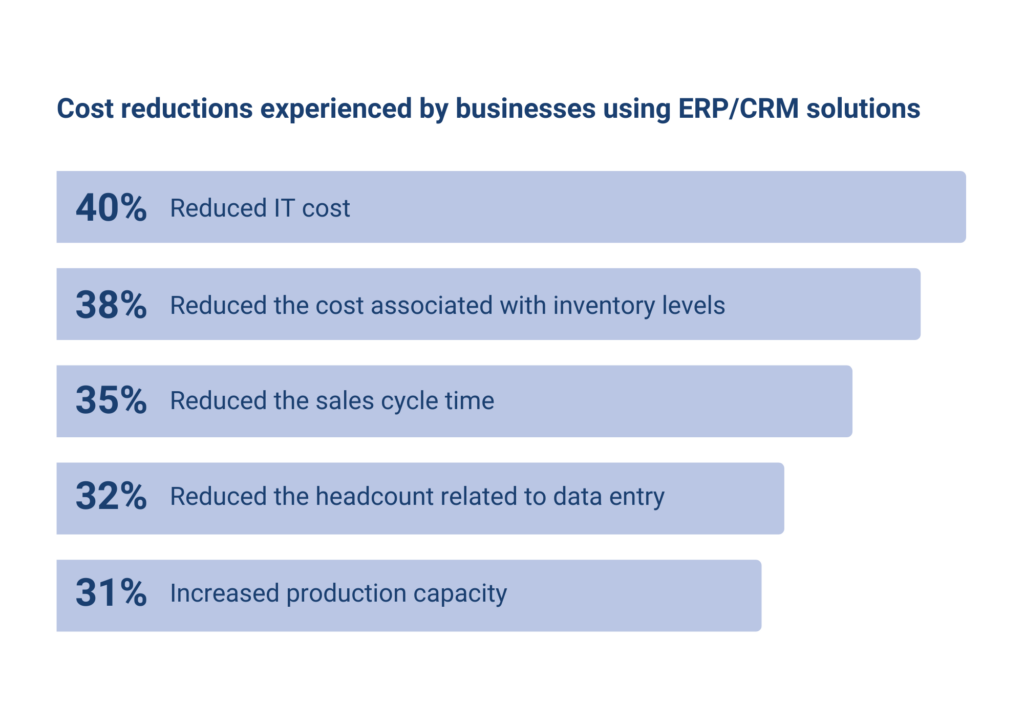Maximizing Profits: How ERP Implementation Drives Cost Reduction and Revenue Growth

Digital transformation has become an integral part of modern business. Many companies begin their journey to digitalization by introducing an ERP system. In this blog post, we will take a quick look at what these systems are and how ERP implementation helps companies not only reduce costs but also increase profits and overall business efficiency.
What is an ERP system?
ERP stands for Enterprise Resource Management. By resources, we mean not only tangible assets but also customer interactions and sales, human capital, knowledge bases, maintenance, logistics, storage, and distribution.
ERP systems help monitor and collect overall data flow about all processes and resources in the enterprise. Based on the analysis of this data, executives and department leaders can optimize management, make informed decisions, and improve operational efficiency.
ERP systems increase visibility and give a bigger picture of everything in the company. With it, you can quickly understand what needs immediate attention, where the quick wins lie, which way processes are interconnected, and how a change in one place will affect the operation of all the others.
Types of ERP Solutions
There are many different ERP solutions on the market. In general, they can be divided into three categories:
- Complex multifunctional and expensive systems for large enterprises from big vendors (SAP, Microsoft, Oracle).
- Industry ERP systems. Tailored for specific economy sectors or types of enterprises. For example, there are many ERP solutions for manufacturing companies.
- Niche ERPs. Highly specialized tools that focus on some specific functionality.
Since no company is an exact copy of another, finding the perfect ERP system can be a daunting task. One of the popular strategic approaches to this is called “Best of Breed.” As part of it, you select the best systems for each department – CRM for sales, HRM for human resources, accounting package, and so on without depending on one specific vendor. Beyond that, you also have a back office that connects all these systems ensuring data interoperability.
A strategy like this is likely to be more costly. However, the ultimate goal of implementing any ERP system is not only to justify the investment but to increase your profit stream. So, how can rolling out new technology bring real money? Let’s figure it out.
How an Effective ERP Implementation Can Drive Revenue Growth
Business is all about money. Even if your global mission is altruistic and you believe you are changing the world for the better, you need revenue and profits to keep growing. Deploying an ERP system is a labor-intensive and investment process, and naturally, you want to know how it will pay off its investment.
Fortunately, in the case of ERP integration, we can calculate success through cost reduction and profit increase. In addition, you will be able to get several strategic benefits that are less obvious in the measurement but have a direct impact on the efficiency of sales and processes.
Measurable ERP Implementation Benefits
Stock reduction
Effective inventory management has a significant impact on the financial health of any company. The ERP system allows real-time tracking of inventory levels, forecasting demand, and optimizing reorder points. You can prevent overstocking or stockouts, reduce inventory costs, and minimize wastage due to obsolescence. Instead of purchasing and storing unpopular stock, you can invest in what is in high demand and increase the speed of sales and deliveries.
Better Planning
ERP systems allow you to make decisions based on data, not guesswork. Your team can gain access to a comprehensive understanding of various aspects of the business within a single system. Integrated data on sales, production, and availability of enterprise resources allows you to create accurate forecasts and better plan your demand and supply.
Process Efficiency
Manual processes and data silos can significantly reduce productivity, such as eating up funds for maintenance and wages while producing minimal results. Integrating with an ERP centralizes data, automates routine tasks, and streamlines workflows across departments. With this, you can minimize errors, reduce cycle times, and free up resources for additional work.
Cost of Legacy Systems
Maintenance, lack of compatibility, and limited functionality of legacy systems can reduce resources from enterprises for years. The more outdated your solutions are, the more you have to invest in prolonging their work. ERP integration eliminates the need to maintain multiple systems, resulting in cost savings and improved resource allocation.
Sales Increase
Improved visibility into customer data and sales trends drives revenue growth and efficiency for your sales force. Companies can tailor their marketing and sales efforts by analyzing customer behavior, preferences, and purchase history, identifying upsell opportunities, and improving the overall customer experience.

Strategic ERP Implementation Benefits
These benefits are harder to quantify, but they have a direct bearing on the success of the enterprise.
Increased Customer Satisfaction
ERP integration enhances the ability to provide accurate information about products, order statuses, and delivery times. This transparency improves customer satisfaction, fosters loyalty, and encourages repeat business.
Increased Employee Experience
Streamlined processes and access to comprehensive data empower employees to make informed decisions and serve customers more effectively. This boost in productivity and job satisfaction eventually positively impacts overall business performance.
Standard Processes
Implementing standardized processes across the organization promotes consistency and reduces inefficiencies. ERP integration enforces best practices, leading to optimized resource utilization and a higher degree of quality control.
Why Do Some Companies Fail with ERP Implementations?
You may have come across stories about how the ERP implementation turned out to be a failure and did not bring profit, but only ate away its part of the investment. As with any “on hype” technology, we often hear radically different reviews, when some call new solutions a silver bullet, while others claim that this is a total fraud.
In fact, many companies do indeed fail with ERP implementation. However, the problem is not in the systems themselves but in the integration and people. Whatever cool and popular system you purchase, if you don’t set it up correctly and implement it into the company’s workflows, it will simply exist for a show.
The implementation of an ERP system requires:
- Careful analysis of existing business processes,
- Properly configuring a system or set of systems to meet business needs
- Training and integration into existing processes of all involved team members
Getting used to new tools always takes time. In the first couple of months, you may even notice a decrease in productivity, but this is a pullback for a future breakthrough. Your ERP system shouldn’t just exist; it should be used and work for your decision-making.
Meet Odoo ERP with First Line Software
At First Line Software, we use an ERP system ourselves and help with integrations with our clients. We work with Odoo – a powerhouse Enterprise Resource Planning (ERP) and Customer Relationship Management (CRM) platform.
As a multi-service company operating in various industries, we have a strong understanding of the specifics of different areas, whether it be manufacturing, e-commerce, or healthcare. As well as our expertise in custom software development allows us to refine solutions as needed and tailor them to the specific needs of each business.
Contact our expert today to learn more about Odoo Implementation with First Line Software, and get the first consultation and step-by-step plan for your reliant ERP integration.
